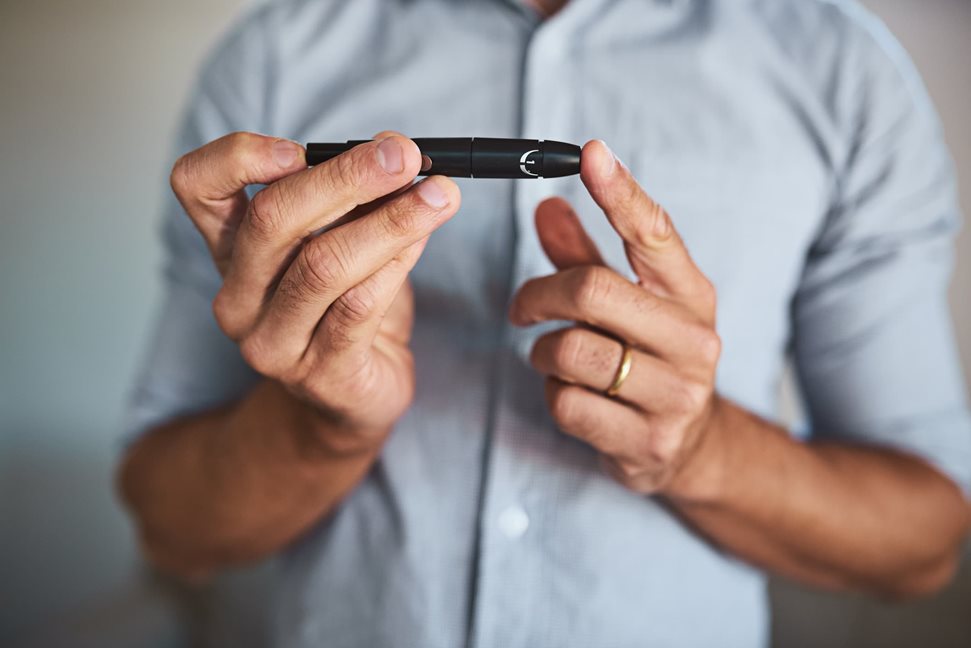Type 2 Diabetes – Causes, Symptoms & Treatment
An estimated 225,800 people are living with diabetes in Ireland and of those, approximately 85-90% have type 2 diabetes. While type 1 diabetes is an autoimmune condition that cannot be prevented, type 2 diabetes is more of a lifestyle condition and it is preventable. We spoke to Sinead Powell, Senior Dietitian with Diabetes Ireland to find out more.
Don’t Wait for Signs and Symptoms to Occur

You can have type 2 diabetes for years before you display any of the signs of symptoms. “It’s important to make sure you don’t have the condition as opposed to waiting for the signs and symptoms,” Sinead explains. “Someone could present with diabetes but not know they’ve actually had it for some time. In that case, they could already have eye damage or nerve damage caused by the condition.” Your best line of defence is to know if you’re at risk of the condition and if you are, get tested.
Know Your Risk
So, what puts you at risk of developing type 2 diabetes? “Certain people will be more at risk than others. Things like being over 40 and being overweight and inactive can increase your risk,” Sinead notes. You can check your own risk by filling in the quick risk assessment calculator on the Diabetes Ireland website. This will let you know if you’re at low, medium or high risk. “If you haven’t had your bloods done in a couple of years and are in the moderate to high risk, you should get tested.”
Managing Type 2 Diabetes
If you are diagnosed with pre-diabetes or type 2 diabetes, the good news is that you can manage the condition with your lifestyle. Recent studies have shown that you can even put it into remission. “Years ago when we said type 2 diabetes, it was a chronic condition and you were stuck with it,” Sinead explains. “What we know now is that with weight loss you can actually put your type 2 diabetes into remission.” Studies have shown that through weight loss you can help restore your Beta Cells (the cells that make insulin) to their former function. “The earlier you’re diagnosed the better,” Sinead explains. “It’s much harder to restore that beta cell function if you’ve had diabetes for 15-20 years. So, it’s really important if someone is diagnosed with type 2 diabetes that they have that information and realise their part in it.”
Adopting a Healthy Lifestyle

Adopting a healthy lifestyle is one of the best things that you can do to protect yourself against type 2 diabetes. “We should all try to adopt a healthy lifestyle and the food pyramid can be a good place to start,” Sinead notes. Portion sizes and snacking are two areas worth paying attention to if you need to lose weight. Try to limit your consumption of top shelf foods – that’s foods high in salt, sugar and fat. “Alcohol is another big contribution to excess weight gain, so keep an eye on your intake.”
Signs and Symptoms
While your best line of defence is to know your risk and get tested, there are signs that you should be aware of that can indicate type 2 diabetes. However, it’s important to note that for many people there are no symptoms prior to diagnosis so regular screening is vital.
Common signs and symptoms are:
- Blurred vision
- Fatigue, lack of energy
- Extreme thirst
- Frequent trips to the bathroom (urination) especially at night
- Rapid and unexplained weight gain or loss
- Frequent infections
- Numbness, pain or tingling in your hands or feet
Long-Term Effects
If you are worried you might have type 2 diabetes, it’s really important that you get tested as it can have serious consequences to your health if left untreated. “Poorly controlled diabetes is linked with four times higher risk of heart attack or stroke,” Sinead explains. “It can damage the blood vessels at the back of the eyes, it also effects your kidneys - about 40% of people on kidney dialysis in Ireland are poorly controlled type 1 and 2.” Nerves and circulation can become compromised with diabetes and, unfortunately, every day in Ireland someone has an amputation due to poorly controlled or managed type 1 or 2 diabetes. Sinead advises, “Get screened, know your risk and, if you’re told you have it, look after yourself with your lifestyle and take your tablets if prescribed because these complications, should they happen, are not reversible.”
You can find out more about type 2 diabetes on the Diabetes Ireland website.
Created October 2019.